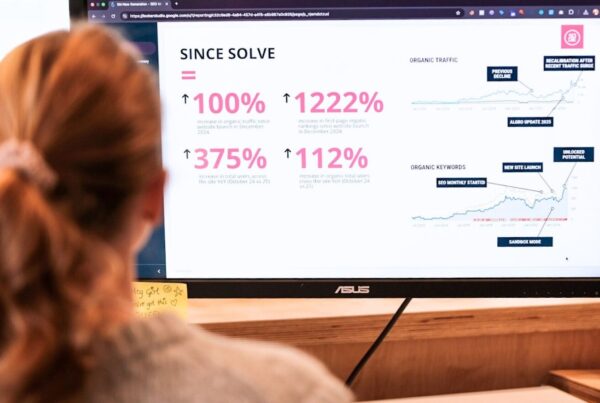
Google’s update to personalise search result rankings is set to change the SEO game. Personalised search results WILL mean changes to SEO strategies for every website, from placing heightened importance on user engagement, causing new challenges for new websites in gaining visibility, making brand loyalty more vital than ever, and more. We’ll explore what these developments mean for businesses and provide practical suggestions on adapting your SEO approach in response to this evolving digital terrain.
What Is Google’s New Personalised Search Results Update?
The new update, set to be released initially in late 2023 to US English results, sees Google showing users search results tailored to their individual preferences and browsing history. So when you make a Google search, sites that you more frequently visit or have engaged with previously will rank higher for you over other sites writing about the same topic. Another user will likely see different results for the same search term based on their search and site preferences.
What Do These Personalised Search Result Rankings Mean for SEO?
Google’s shift towards personalised search result rankings presents new challenges and opportunities for SEO. The core aim of SEO is to elevate websites to top positions in search results, which will be made more difficult when everyone’s top positions differ. Strategies must adapt to cater to these individualised search experiences and maximise the share of users for whom your website ranks in top search results.
Heightened Importance of User Experience on Websites
User experience should always have been at the forefront of SEO strategies, with Google making clear it was a ranking factor for content. However, with search results prioritising websites that a user regularly visits, this is more crucial than ever. You must ensure your website offers the best user experience, from design to site speed and ease of navigation to engaging content, to ensure users keep coming back.
Impact on SEO Strategies
To adapt, SEO must focus on optimising website design, improving load times, and creating content that captivates and retains visitors, enhancing overall user engagement and satisfaction. The interconnection between web design, web development, and SEO becomes even more blurry as the three need to work together to get the best results possible, so your strategy needs to consider and utilise the power of all three.

Purple Goat Case Study
The Purple Goat website is the perfect example of how SEO needs to work closer than ever with design and development. Within the build, Solve’s SEO, development and design teams worked closely to create a website that performed for search engines and users, with accessibility and user experience at the forefront.
Brand Loyalty and Recognition Are Vital
With personalised search, users are more likely to see results from brands they know and trust, as these are the sites they will visit most often. Building a strong, recognisable brand is therefore essential.
Impact on SEO Strategies
SEO efforts need to include strategies for building brand awareness and loyalty, such as:
- Consistent branding – Maintaining a uniform visual and textual brand identity across all online platforms reinforces brand recognition and creates a cohesive user experience.
- Targeting a higher volume of total keywords with an increased focus on unbranded keywords – Appearing consistently in search results for a wide range of keywords, especially unbranded ones, increases visibility and positions your brand as an authority in your industry.
- Leveraging Content Marketing – Creating and sharing valuable, informative content that resonates with your audience can establish your brand as a thought leader and go-to resource in your field.
- Encouraging Customer Reviews and Testimonials – Prominently displayed and optimised for search, positive reviews and testimonials can significantly boost brand credibility and foster trust among potential customers.
Increased Importance of Multi-channel Marketing Strategies
The increased importance of multi-channel marketing strategies is closely linked to brand loyalty and recognition. Google is personalising results based on websites a user regularly visits; it doesn’t matter where they come from to get to the website. Yes, it might be that they regularly visit you via organic search, but it might be from social media, coming directly, they may be referred from another site, etc. You need to optimise EVERY channel that could drive users to your website to secure more of those top positions.
Impact on SEO Strategies
SEO strategies must now integrate a more holistic, multi-channel marketing approach. This involves not only optimising for organic search but also considering optimising your social profile with things like TikTok SEO and YouTube SEO, giving an increased focus on backlink building, which will drive high volumes of engaged website traffic and raise brand awareness, and solid creating content sharing strategies for your SEO content to drive as many users to the site from them as possible. Monitoring and analysing traffic from all these sources becomes crucial to understanding which channels are most effective in driving traffic and engagement, allowing for more targeted and effective SEO efforts. The goal is to create multiple touchpoints with users across various platforms, increasing the likelihood of your website being a regular destination and, therefore, showing in their personalised search results.
A Change in Google Experience for Users
The more tailored Google experience for each user, based on their past interactions and preferences, is likely to change users’ experience on Google for the better by showing them things they actually want to see. As a result, they may be even more likely to use the search engine.
Impact on SEO Strategies
SEO strategies need to include an in-depth analysis of user behaviour and preferences. Conducting detailed research into your target audience and what they are looking for is even more vital. As a result, you can tailor content to match these insights, thus aligning more closely with the individualised nature of search results.

Challenges for New Websites
The new personalised ranking system that ranks sites higher if a user has been to them before will likely hit new websites hard. New websites may struggle to appear in personalised search results due to a lack of historical data and an established user base.
Impact on SEO Strategies
New website SEO strategies must be adapted to prioritise visibility and discovery. Targeting niche keywords to capture specific market segments, utilising long-tail keywords to attract more targeted traffic, and investing in content that addresses unique user queries and interests will help build this initial trust and historical data. Emphasising local SEO can also help gain traction in specific geographic markets, and building quality backlinks through guest blogging, collaborations, and online PR can aid in increasing traffic from sources other than organic search initially, increasing the site’s authority and chances of appearing in search results.
Conclusion: Adapting to the Personalised SEO Landscape
In the ever-evolving world of digital marketing, Google’s new personalised search ranking feature marks a significant shift, necessitating a reevaluation and adaptation of SEO strategies. From enhancing user experience and building brand loyalty to embracing multi-channel marketing and conducting in-depth user behaviour analysis, the landscape of SEO is becoming more dynamic and user-centric. For new websites, the challenge is even more significant, requiring innovative approaches to gain visibility and build a loyal user base. As Google continues to personalise the search experience, staying agile and responsive to these changes is crucial for businesses aiming to maintain and improve their search engine rankings. This evolution in search underlines the importance of a holistic, adaptable SEO strategy in today’s digital age.

Get help with an SEO strategy that adapts to personalised search and will help propel your business to online success.
Speak to Anna – One of Our SEO Experts.





